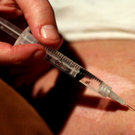Articles tagged with: G-CSF
News»

A recent retrospective study finds that initial treatment with Revlimid may not prevent myeloma patients from collecting enough stem cells for transplantation.
Many of the study's results confirm the findings of previous research, which has shown that Revlimid (lenalidomide) reduces a patient's ability to mobilize stem cells for stem cell collection (see related Beacon news).
However, only 2 percent of the patients in the new study were unable to mobilize enough stem cells for at least a single transplant, and this low overall rate of mobilization failure was the same in patients who …
NewsFlash »
Every-Other-Day G-CSF Is Just As Effective As Daily G-CSF – Results from a recent Turkish study indicate that every-other-day administration of granulocyte colony-stimulating factor (G-CSF) is just as effective as daily administration following stem cell transplantation. Additionally, every-other-day administration was found to be safe and resulted in a significant reduction in drug costs, according to the investigators. The study included 47 patients with lymphoma or myeloma who underwent a stem cell transplant. Half of the patients received G-CSF every day, while the other half received G-CSF every other day, after stem cell transplantation until their white blood cell counts recovered. The researchers found that the frequency of G-CSF administration did not affect the amount of time until white blood cell counts recovered. There also were no significant differences in hospitalization time, rates of infection, and transfusion requirements in patients who received daily G-CSF compared to every other day G-CSF. For more information, please see the study in Transfusion and Apheresis Science (abstract).
Partial Deletion Of Chromosome 8 May Be Common In Multiple Myeloma – Results from a small French study indicate that it is common for multiple myeloma patients to have myeloma cells that are missing part of chromosome 8. Specifically, the study investigators found that among 37 myeloma patients, 22 percent had myeloma cells that were missing a region of the short arm of chromosome 8 (technically called 8p21.3 deletion). This chromosomal region contains the DNA that is used to make proteins called TRAIL receptors. These receptors play an important role in cell death. When their corresponding chromosomal region is missing, the cell cannot make TRAIL receptors, and abnormal growth of the cells occurs. The researchers found that most of the patients who had the chromosome 8 deletion also had other chromosomal abnormalities commonly associated with myeloma. For more information, please see the study in Medical Oncology (abstract).
Hepatitis B Infection May Impact Survival Of Myeloma Patients Who Receive Stem Cell Transplants – Results of a retrospective Chinese study found that myeloma patients who also have hepatitis B typically have shorter survival following stem cell transplantation, compared to myeloma patients who do not have hepatitis B. Hepatitis B is a viral infection of the liver that can cause damage and scarring to the liver, liver cancer, and liver failure. The study included 70 myeloma patients, 34 of whom also had hepatitis B. After stem cell transplantation using their own stem cells, the three-year overall survival rates were 35 percent for those who also had hepatitis B and 85 percent for those who did not have hepatitis B. The researchers suggest that hepatitis B antiviral treatment may reduce the negative impact hepatitis appears to have on survival. For more information, see the study in Tumor Biology (abstract).
News»

Results of a recent Italian study show that Neupogen and Neulasta are comparable in efficacy and safety for the prevention and treatment of low white blood cell counts in multiple myeloma patients receiving outpatient stem cell transplants.
However, patients who were treated with Neulasta only received one injection after the transplant, which according to the study authors may be more convenient for the patients.
“In our experience, the possibility of a single [injection] is more comfortable for patients, mainly in an outpatient regimen,” said Dr. Felicetto Ferrara of the Cardarelli Hospital in …

